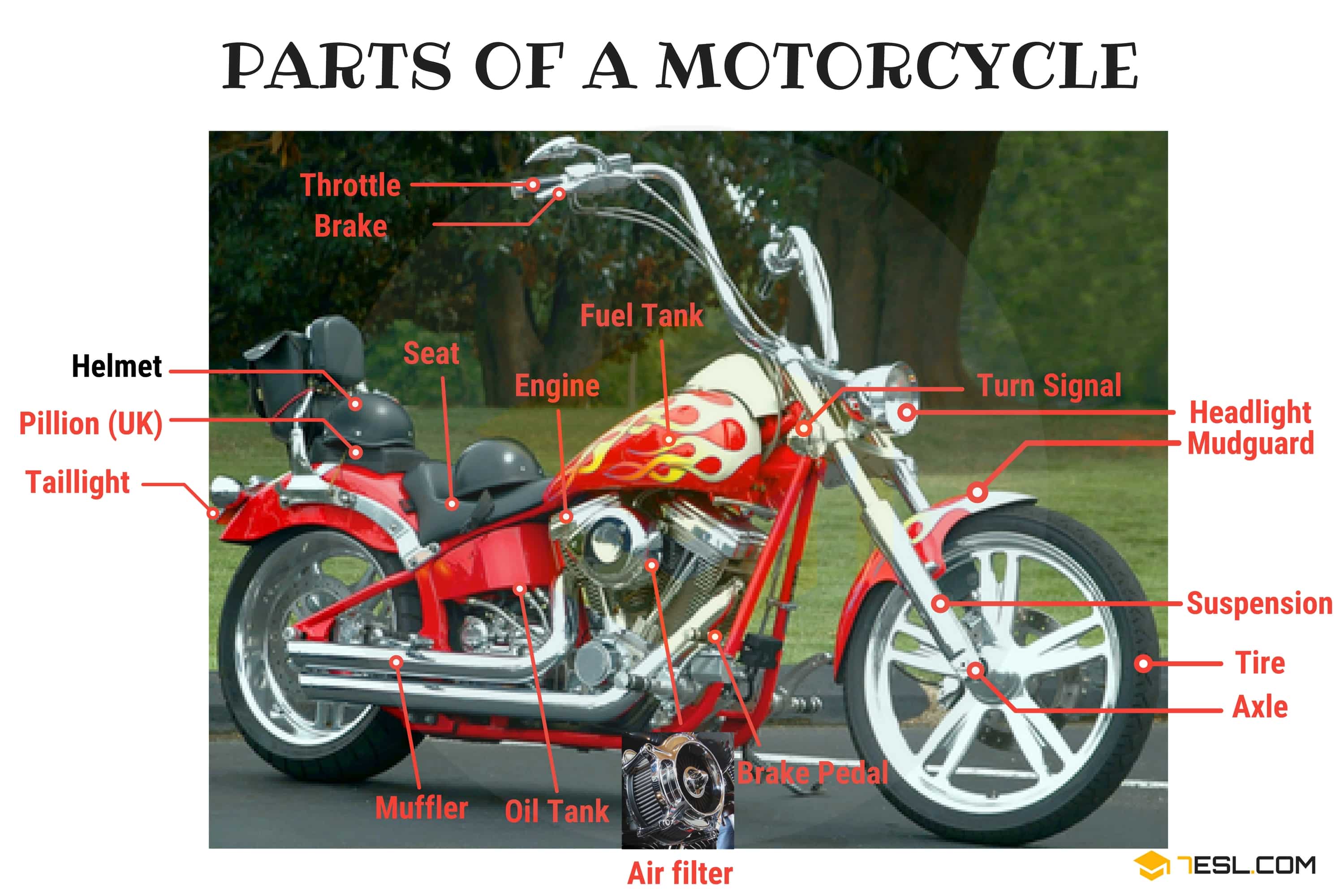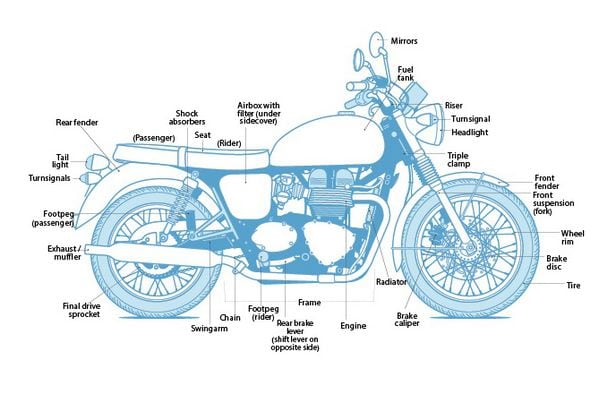Discover the Necessary MotorBike Components You Required for Optimal Efficiency
Comprehending the crucial parts of a bike is essential for attaining peak efficiency. Each element, from the engine to the braking system, plays a vital function in total capability and safety and security. Routine maintenance can protect against unexpected failings and improve the riding experience. Many motorcyclists neglect the intricacies of these systems. Uncovering how they interact can result in a more reliable experience. What crucial elements should every cyclist prioritize?
The Engine: The Heart of Your Bike
The engine offers as the core element of a bike, driving its efficiency and defining its capacities. It is in charge of converting gas into mechanical energy, which powers the bike forward. Numerous kinds of engines are used, consisting of single-cylinder, V-twin, and inline setups, each offering unique features fit for different riding designs and functions. The engine size, commonly measured in cubic centimeters (cc), considerably affects efficiency, with bigger engines generally giving more power and torque.Furthermore, the engine's layout and modern technology, such as fuel shot systems or air-cooling versus liquid-cooling, affect performance and dependability. Upkeep is vital for peak operation; variables like routine oil changes and checking trigger plugs guarantee longevity. Motorcyclists often think about an engine's responsiveness and level of smoothness, as these characteristics improve the total riding experience. Inevitably, the engine continues to be a crucial component that specifies not only the bike's efficiency yet also the motorcyclist's connection to the maker.
The Transmission: Changing Gears Smoothly
The transmission plays a vital function in a motorcycle's performance, especially in the auto mechanics of equipment moving. Recognizing how to change gears smoothly can improve the total riding experience, while regular maintenance guarantees peak functionality. Correct interest to these elements can substantially affect the longevity and efficiency of the bike.

Gear Shifting Mechanics
Smooth equipment changing is crucial for optimal motorbike efficiency, considerably influencing both velocity and control. The auto mechanics of gear shifting entail the communication between the clutch, gear lever, and transmission system. When a biker engages the clutch, it disengages the engine from the transmission, enabling an equipment adjustment without damaging the components. A well-timed release of the clutch, combined with accurate motion of the equipment bar, promotes a seamless change in between equipments. This process assures that the engine runs within its ideal power band, improving performance. Oem Parts New Zealand. Additionally, recognizing the gear proportions and their result on rate and torque can help motorcyclists make educated choices throughout changes, ultimately contributing to a much more responsive and enjoyable riding experience
Upkeep Tips Value
Routine upkeep plays a necessary role in assuring that the transmission system operates successfully, permitting for smooth gear changes. Regularly transforming the transmission and inspecting fluid is essential, as old fluid can result in raised rubbing and wear. Additionally, inspecting the clutch for wear guarantees peak involvement and disengagement, avoiding slippage throughout equipment modifications. Lubrication of moving components is similarly essential to lower friction and boost efficiency. Motorcycle owners should also check for leaks and unusual sounds, as these can indicate underlying concerns. By sticking to these upkeep pointers, motorcyclists can lengthen the lifespan of their transmission system, guaranteeing that gear changes continue to be seamless and adding to the overall efficiency of their motorbike.
The Braking System: Ensuring Security on Every Experience
Braking systems are fundamental components that straight influence a motorbike's safety and security and efficiency. They consist of numerous components, consisting of brake pads, blades, calipers, and hydraulic lines, all functioning with each other to ensure efficient slowdown. The type of stopping system-- usually either disc or drum-- affects responsiveness and quiting power.Regular maintenance is important to support peak efficiency; used brake pads can cause decreased effectiveness and enhanced quiting distances. Additionally, the quality of brake fluid need to be kept an eye on, as it can soak up dampness in time, jeopardizing stopping efficiency.Riders should also consider the importance of anti-lock braking systems (ABS), which protect against wheel lockup during abrupt quits, boosting general safety. Correctly working brakes are not nearly quiting; they impart confidence in the biker, permitting more secure navigation through different terrains. Eventually, a trustworthy braking system is critical for delighting in every experience with comfort.
The Suspension: Enhancing Comfort and Control
A well-functioning suspension system substantially contributes to a motorcycle's general performance, complementing the effectiveness of the braking system. The suspension plays a significant function in taking in shocks from unequal surfaces, guaranteeing a smoother adventure while preserving tire contact with the road. This contact is crucial for both stability and control, permitting cyclists to browse edges with confidence and precision.Different types of shock absorber, such as telescopic forks or mono-shocks, provide varying degrees of comfort and handling. Effectively tuned suspension boosts responsiveness, supplying the cyclist with a more linked feeling to the motorcycle. Routine maintenance checks are crucial to determine the suspension components, including springtimes and dampers, are working at their ideal. A reliable suspension system not only raises the riding experience but additionally adds to the durability of various other motorcycle components by reducing deterioration. Because of this, buying high quality suspension is essential for any significant motorbike enthusiast.
The Tires: Attaching You to the Road
Tires play a necessary duty in a motorcycle's efficiency, serving as the key link between the cyclist and the road. Comprehending the various sorts of tires available can content substantially impact handling and safety. In addition, routine upkeep is essential to assure peak tire performance and long life.
Tire Keys In Explained
Just how do different tire types affect a motorcycle's efficiency? Tire kinds play an essential duty in establishing a motorcycle's stability, handling, and grasp. Sport tires, created for high efficiency, deal improved traction and responsiveness on paved roadways, making them suitable for competing and aggressive riding. Conversely, visiting tires focus on sturdiness and convenience, offering a smoother ride for long-distance travel. Off-road tires, defined by their tough tread patterns, master grip on unpaved surface areas, ideal for adventure lovers. Furthermore, dual-sport tires blend features from both off-road and on-road categories, dealing with functional riding requirements. Inevitably, choosing the best tire kind is important for enhancing efficiency, making certain safety, and improving the general riding experience.
Maintenance Tips Offered
While riding on the roadway, maintaining ideal tire condition is vital for safety and performance. On a regular basis inspecting tire pressure is very important, as under-inflated tires can bring about poor handling and raised wear. It is suggested to check walk depth often; worn tires concession hold and security. On top of that, motorcyclists should look for signs of damage, such as bulges or splits, which can indicate the need for substitute. Rotating tires periodically guarantees also wear, boosting long life. Furthermore, maintaining tires clean from debris and avoiding excessive aesthetics can extend their lifespan. Lastly, preserving proper alignment official site and balance adds to peak performance, minimizing anxiety on various other bike components. Following these upkeep ideas will significantly improve the total riding experience.
The Gas System: Fueling Performance and Effectiveness
The fuel system plays an important duty in maximizing a motorbike's performance and effectiveness, as it guarantees the ideal distribution of gas to the engine. It consists of a number of important components, including the gas tank, gas pump, gas filter, and gas injectors or carburetor. Each part should operate successfully to guarantee a effective and smooth ride.The fuel storage tank shops gasoline and provides it to the engine through the gas pump, which produces the essential stress. A fuel filter avoids pollutants from entering the engine, while the injectors or carburetor mix fuel with air for combustion.Proper upkeep of the gas system is important; a clogged up filter or malfunctioning injector can bring about decreased performance and raised fuel consumption. By confirming that the fuel system runs effectively, bikers can appreciate better throttle action, better fuel economic climate, and in general improved riding experience.
The Electrical System: Powering Your Trip
A reliable electrical system is essential for the total capability and security of a motorcycle, as it powers essential parts such as the ignition, lights, and different digital systems. This system includes the battery, which stores power, and the generator, responsible for creating power while the engine runs. The electrical wiring harness connects these elements, guaranteeing reputable power distribution.Additionally, integrates secure the system from overloads, while relays help manage high-current devices with low-power signals. A properly maintained electric system boosts performance by making sure smooth starts and consistent procedure of signals and lights, important for cyclist exposure and safety.Regular checks of the battery's cost and links are essential for preventing electric failings. Bikers should likewise evaluate electrical wiring for damage, making sure all elements operate ideally. Inevitably, a robust electric system contributes considerably to the total performance and dependability of the motorcycle.
Regularly Asked Questions
Exactly how Commonly Should I Change My Bike's Battery?
The frequency of motorbike battery replacement depends on usage and maintenance (Motorcycle Parts Auckland). Usually, batteries need to be replaced every 3 to 5 years. Routine checks can assist determine when a substitute is needed for peak performance
What Devices Do I Required for Standard Bike Upkeep?
For standard bike upkeep, one requires important tools such as a socket set, wrenches, screwdrivers, pliers, tire pressure gauge, and a torque wrench. These devices assist in reliable upkeep and assure the motorbike runs successfully and safely.
How Can I Enhance My Motorbike's The rules of aerodynamics?
To improve motorcycle aerodynamics, one ought to think about readjusting fairings, using windshield expansions, maximizing body setting, and reducing overall weight. These modifications assist reduce drag, improving security and gas effectiveness during adventures.
What Are the Signs of a Failing Electrical System?
Signs of a stopping working electrical system consist of lowering lights, problem beginning, irregular instrument analyses, and blown fuses. Motorbike Components NZ. Unusual smells or deterioration around battery terminals might also indicate underlying problems needing instant attention for safety and security and performance

Exactly how Do I Choose the Right Oil for My Bike?
When picking oil for a motorbike, one ought to take into consideration the supplier's specs, viscosity rankings, and the sort of riding. Additionally, standard versus artificial oil can impact efficiency and engine defense, influencing the choice significantly. The engine dimension, typically measured in cubic centimeters (cc), considerably affects performance, with bigger engines normally offering more power and torque.Furthermore, the engine's layout and innovation, such as fuel injection systems or air-cooling versus liquid-cooling, influence effectiveness and dependability. A well-functioning suspension system substantially adds to a motorbike's total efficiency, matching the effectiveness of the braking system. The gas system plays a crucial role in making best use of a motorcycle's efficiency and effectiveness, as it ensures the optimum shipment of fuel to the engine. A gas filter stops contaminants from getting in the engine, while the injectors or carburetor mix gas with air for combustion.Proper upkeep of the gas system is critical; a stopped up filter or malfunctioning injector can lead to decreased efficiency and increased fuel usage. A well-kept electric system improves efficiency by guaranteeing smooth beginnings and consistent operation of signals and lights, essential for biker presence and safety.Regular checks of the battery's fee and visit this web-site connections are essential for preventing electrical failings.